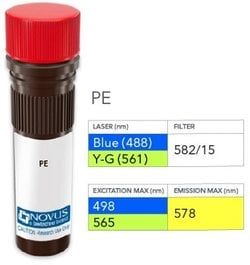NGFR/TNFRSF16/p75NTR Antibody (NTR/912) - IHC-Prediluted, Novus Biologicals™
Manufacturer: Novus Biologicals
Select a Size
| Pack Size | SKU | Availability | Price |
|---|---|---|---|
| Each of 1 | NBP248297-Each-of-1 | In Stock | ₹ 46,636.00 |
NBP248297 - Each of 1
In Stock
Quantity
1
Base Price: ₹ 46,636.00
GST (18%): ₹ 8,394.48
Total Price: ₹ 55,030.48
Antigen
NGFR/TNFRSF16/p75NTR
Classification
Monoclonal
Conjugate
Unconjugated
Formulation
10mM PBS and 0.05% BSA with 0.05% Sodium Azide
Gene Symbols
NGFR
Immunogen
Recombinant human NGFR/TNFRSF16/p75NTR protein (Uniprot: P08138)
Purification Method
Protein A or G purified
Regulatory Status
RUO
Primary or Secondary
Primary
Test Specificity
It recognizes a glycoprotein of 75kDa, identified as low affinity Nerve Growth Factor (NGF) Receptor (p75NGFR) or Neurotrophin Receptor (p75NTR). NGFR is expressed in various neural crest cells and their tumors such as melanocytes, melanomas, neuroblastomas, pheochromocytomas and neurofibromas. Reportedly, anti-NGFR is a reliable marker for desmoplastic and neurotropic melanomas. NGFR is expressed in mature non-neural cells such as perivascular cells, dental pulp cells, lymphoidal follicular dendritic cells, basal epithelium of oral mucosa and hair follicles, prostate basal cells, and myoepithelial cells. Anti-NGFR stains the myoepithelial cells of breast ducts and intra-lobular fibroblasts of breast ducts.
Content And Storage
Store at 4C.
Isotype
IgG1 κ
Applications
Immunohistochemistry (Paraffin)
Clone
NTR/912
Dilution
Immunohistochemistry-Paraffin
Gene Alias
CD271, CD271 antigen, Gp80-LNGFR, member 16, nerve growth factor receptor, NGF receptor, p75 ICD, TNFRSF16nerve growth factor receptor (TNFR superfamily, member 16), tumor necrosis factor receptor superfamily member 16
Host Species
Mouse
Molecular Weight of Antigen
75 kDa
Quantity
7 mL
Research Discipline
Apoptosis, Neuronal Cell Markers, Neuronal Stem Cell Markers, Neuroscience, Stem Cell Markers
Gene ID (Entrez)
4804
Target Species
Human, Primate, Mouse (Negative), Rat (Negative)
Form
Purified
Description
- NGFR/TNFRSF16/p75NTR Monoclonal specifically detects NGFR/TNFRSF16/p75NTR in Human, Primate, Mouse (Negative), Rat (Negative) samples
- It is validated for Immunohistochemistry, Immunohistochemistry-Paraffin.


